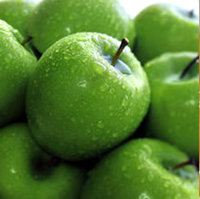An outbreak of listeriosis in late 2014 and early 2015 associated with caramel apples led to questions about how this product became a vector for Listeria monocytogenes.
 This investigation aimed to determine information about the survival and growth of L. monocytogenes in both fresh apples and caramel apples, specifically examining the effects of site and level of inoculation, inoculum drying conditions, and storage temperature.
This investigation aimed to determine information about the survival and growth of L. monocytogenes in both fresh apples and caramel apples, specifically examining the effects of site and level of inoculation, inoculum drying conditions, and storage temperature.
At a high inoculation level (7 log CFU per apple), L. monocytogenes inoculated at the stem end proliferated on Gala caramel apples at both 5 and 25°C and on Granny Smith caramel apples at 25°C by as much as 3 to 5 log CFU per apple. Fresh apples and caramel apples inoculated at the equatorial surface supported survival but not growth of the pathogen. Growth rates (μmax) for apples inoculated at the stem end, as determined using the Baranyi and Roberts growth model, were 1.64 ± 0.27 and 1.38 ± 0.20 log CFU per apple per day for Gala and Granny Smith caramel apples, respectively, stored at 25°C. At a low inoculation level (3 log CFU per apple), L. monocytogenes inoculated at the stem end and the equatorial surface survived but did not grow on fresh Gala and Granny Smith apples stored at 25°C for 49 days; however, on caramel apples inoculated at the stem end, L. monocytogenes had significant growth under the same conditions.
Although certain conditions did not support growth, the pathogen was always detectable by enrichment culture. The inoculation procedure had a significant effect on results; when the inoculum was allowed to dry for 24 h at 5°C, growth was significantly slowed compared with inoculum allowed to dry for 2 h at 25°C.
Variation in stick materials did affect L. monocytogenes survival, but these differences were diminished once sticks were placed into caramel apples.
Fate of Listeria monocytogenes in fresh apples and caramel apples
Journal of Food Protection®, Number 5, May 2016, pp. 696-889, pp. 696-702(7)
Salazar, Joelle K.; Carstens, Christina K.; Bathija, Vriddi M.; Narula, Sartaj S.; Parish, Mickey; Tortorello, Mary Lou
http://www.ingentaconnect.com/contentone/iafp/jfp/2016/00000079/00000005/art00001

